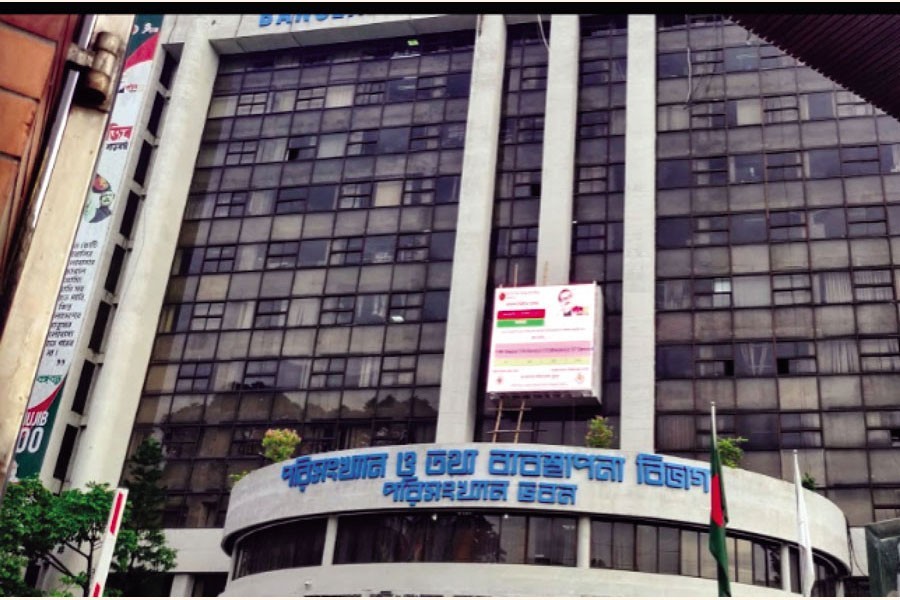The final numbers that the Bangladesh Bureau of Statistics (BBS), the national statistical organisation, disclosed last Thursday on GDP (gross domestic product) for the fiscal year (FY) 2019-20 might have surprised many.
The plausible reasons for evoking surprise could be: (1) a notable cut in the revised GDP growth estimates; and (2) the BBS has done final estimates of a financial year after a gap of one year and published those. The BBS has never done so. Is the deviation from the past practice because of the pandemic? The country's economy took the initial hit from the pandemic in the final quarter of FY '20.
Whatever may be the reason both the BBS and the Ministry of Planning deserve kudos for trying to earn some amount of credibility.
It is not that the plaudits are for revising the growth estimates downward. None wanted to see things that way. The pandemic has done all the damage to life and livelihoods and the economy as well. Barring agriculture, most sectors took the brunt in FY '20 and FY '21. The onslaught is still on. So, there is no certainty that all numbers would go in line with projections.
Some people in authority who are prone to playing to the gallery even during the difficult times might have been disappointed by the figures that the BBS has come up with lately.
But the truth is the publication of the final macroeconomic data on FY'20 will help the BBS retrieve credibility, to some extent. Further retrieval of the same would depend on whether it is willing to stick to the path it has chosen lately.
The incumbent planning minister might have been instrumental in bringing about the change in approach at the BBS. The minister on several occasions has referred to the questions that various quarters often ask about the quality of the government data.
The final estimates of the FY 2019-20 GDP data done by the BBS are more or less credible given the situation prevailed both at home and abroad at that time. The final count has brought down the growth to a 30-year low at 3.51 per cent. The BBS had earlier revised the GDP growth for FY '20 downward to 5.24 per cent due to the Covid fallout. The original growth target for the FY was 8.2 per cent.
The government could have stuck to the revised projection. But that would have been improper since the sectoral growth data tell an altogether different story.
The industry sector grew between 10.5 per cent and 12.5 per cent a year until FY'19. But it slumped to a little over 3.25 per cent in FY'20. The service sector growth also plunged to 4.16 per cent in FY'20 from the previous year's 6.8 per cent. The agricultural sector's impressive growth has helped the economy absorb much of the pandemic shock. The sector even did better than the previous year and grew at over 4.0 per cent. It also employed many unemployed people who had returned to villages from urban centres after losing jobs and sources of earning due to the pandemic.
The 3.51 per cent GDP growth in FY'20 was much lower than that of any year in the recent past. But it is rated as an impressive one under the given circumstances. A large number of countries, including the developed ones, recorded negative growth in that year as the virus wreaked havoc in the initial months of its invasion.
The BBS has also trimmed its earlier GDP growth estimate for the immediate past fiscal year (FY 2020-21) to 5.47 per cent. The government had set the growth target at 8.2 per cent, which was later revised down to 6.1 per cent. Yet another downward revision is not unlikely in the event of final count by the BBS.
The government had offered stimulus packages and other fiscal incentives to help keep the economy buoyant. But some developments were beyond the control of the government and businesses. Moreover, there had been questions about the proper use of the incentives and stimulus packages.
It is natural for an economy to encounter both positives and negatives. Everybody, however, expects objectivity from the national statistical organisations while collating and compiling data and interpreting those in the broader national context.
Manipulated economic data might help someone hide the real situation for a certain period, but truth ultimately comes out or is revealed. The economy, meanwhile, sustains a certain amount of injury. Such a development can be easily avoided, only if the relevant statistical organisation is allowed to do its job honestly and faithfully and without any outside interference.
Such data preparation is all the more necessary in a country like Bangladesh where the government remains the only source of all-important macroeconomic data. Plans and programmes prepared using authentic data work better and deliver the goods. This is particularly true for government agencies. Hopefully, the government policymakers will try to keep this in mind.


